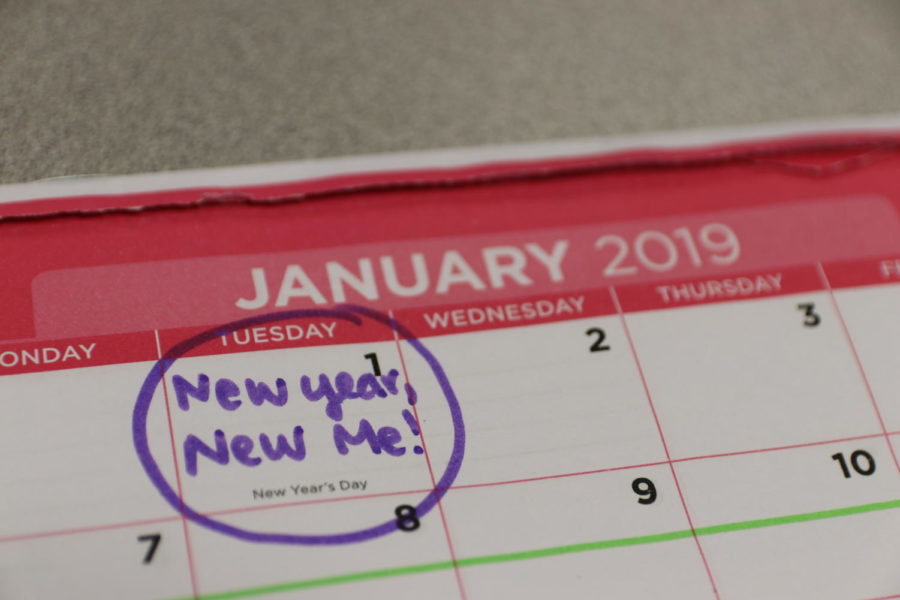Goals Provide An Alternative, More Efficient Path to Achievements
Media by Marta Mieze
As she counted the last second until the new 2019 year, Jaimee Bunderson, freshman, was not worried about the resolutions she would have had to keep for the whole year. However, many of the people around her were hoping that, this year, “New Year, New Me” would hold true.
However, a Statistic Brain study showed that only 9.2 percent of people go through with their resolutions and change their bad habits.
Bunderson said the changes she wanted to bring to her life already began at the start of the school, so, when the new year came around, she had nothing else she felt the need to change.
“I think people just want an excuse to try to become a better person and… New Year’s is just a good time to do that,” Bunderson said.
In the past, Bunderson said she has tried New Year’s resolutions, but has never been able to go the whole year without breaking them.
“I actually started eating no sugar one year and then I broke it after like two days,” Bunderson said.
Even though she has noticed that most people don’t follow through with their resolutions, Bunderson said it is still a good way for people to motivate themselves to change their habits.
She said achieving goals and keeping up New Year’s resolutions comes down to how bad people actually want to see change in their lives.
“Motivation is a key part of changing who you are,” Bunderson said.
Laura Coverstone, language arts teacher, said she recently read that, instead of setting New Year’s resolutions, people should set general goals. Because usually people think through goals much more than resolutions, it makes the goals more achievable. She said she has seen this in her own life, as she has had much more success with goals she’s placed than with past New Year’s resolutions.
In her own life, Coverstone is currently working on a goal with her husband to do a Shaklee seven-day cleanse while also joining a six-week challenge at her gym.
“Usually at the end of the year, I feel like we’ve gone overboard on holiday fun and feasting, so I always feel like it’s nice to reset,” Coverstone said. “I always feel like it puts me in a good place.”
A resolution often is not attainable, Coverstone said, because it is just one big goal without a plan in place. She said if goals are set according to the SMART principle, which means goals are specific, measurable, attainable, relevant and time-based, there is an outline of steps to take in order to achieve that goal.
When it comes to her students, Coverstone said she tries to encourage some of her students to set goals. While for some students the goals work, for others they don’t.
“I think it is a personality kind of thing,” Coverstone said. “Some people are in the mindset to plan and check off items on a list, others maybe go with the flow more.”
Dr. Lora Park, psychology professor at University at Buffalo, said the most common New Year’s resolutions are improving health and fitness, strengthening relationships and improving performance at work or school. She said these are so popular due to the feeling of wanting a clean slate as the new year begins.
“Sometimes people’s New Year’s resolutions reflect what they think they
should do, but they haven’t fully internalized the behavior or goal as an important aspect of who they are or how they think about themselves,” Dr. Park said.
In this case, many resolutions can be made due to pressure from others, which Dr. Park said makes them easier to give up if there are not immediate rewards. This makes it important to think about how resolutions could benefit you and why they matter, as opposed to why you should set them.
Dr. Park said, when it comes to New Year’s resolutions, many people have an all or nothing mentality, which also makes them more likely to quit. Instead, mistakes should be an opportunity to alter goals to make them more attainable.
“The key is how you’re going to handle the obstacles and challenges that come your way,” Dr. Park said.
There are different types of motivation, Dr. Park said, and it is important to know which one works for you personally in order to be able to achieve goals. Motivation can be extrinsic, where you are driven by rewards or punishments, intrinsic, where you focus on the enjoyment and satisfaction of the activity, or in between, in which you might not be forced to complete a certain task but may want to because it makes you feel good.
When setting goals, Dr. Park said it is important to make sure smaller goals connect to a larger, broader goal.
“Realize that even if you falter or flat out fail in pursuing this goal, there are many ways you can achieve the broader, larger goal that is important to you,” Dr. Park said.
She said achieving goals has also a lot to do with habits. It is important to include the goal in a routine and have cues for that activity and also have a reward afterwards.
“People can achieve goals if they are realistic, attainable, and if they create daily habits that support their goal,” Dr. Park said. “Failure along the way is just as important, if not more important than, success because through failure you learn so much about yourself and your capacity to be resilient and persist.”
Your donation will support the student journalists of Marquette High School. Your contribution will allow us to purchase equipment and cover our annual website hosting costs. You may become a PATRON by making a donation at one of these levels: White/$30, Green/$50, Blue/$100. Patron names will be published in the print newsmagazine, on the website and once per quarter on our social media accounts.

Marta Mieze, senior, is the Co-Editor-in-Chief for the Messenger and the Script Editor for MHSNews. She has been on the Messenger staff since 2017 and...







